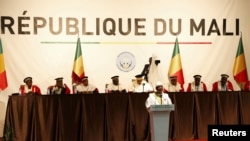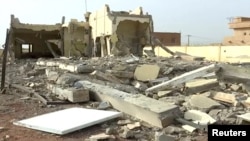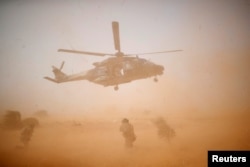As he was sworn in to start a second term this week, Mali's President Ibrahim Boubacar Keita promised to address insecurity in the northern and central parts of the country, caused by a continued Islamist insurgency.
"I chose to place the re-establishment of peace and security at an absolute level of priority," the president told hundreds of supporters and diplomats during the inauguration ceremony in Bamako, the capital.
But while the president may be starting a new term, the old foes that dogged him throughout his first term seem to be getting bolder. In June, gunmen attacked the headquarters of the G5 Sahel Force in Sevare, killing six people. In July, a French military patrol was ambushed in the northern city of Gao; four civilians were killed in a shootout.
"Extremists are a threat to [Malian] democracy, a threat to our way of life," said Niankoro Yeah Samake, former Malian ambassador to India and one of the presidential candidates during the last elections.
Expanding terror threat
"Today in Mali, there are people and students who cannot go to school because of insecurity," said Aissatou Traore, a student living in Bamako.
"There are towns and villages which are very dangerous to access, the population can't go anywhere because of insecurity," she told VOA.
The Africa Center for Strategic Studies in Washington, D.C., recently published a study on the situation in Mali, which noted the country is facing multi-layered security challenges.
Wendy Williams, an analyst with the center, said the coalition of terror groups under the umbrella Group for the Support of Islam and Muslims, known as the JNIM, have stepped up their activities in parts of Mali.
"They pose a significant threat to the security in the central and northern regions, considering they don't appear to be showing any signs of slowing down," Williams added.
As if to underscore that warning, the U.S. State Department on Wednesday designated the JNIM as a terrorist organization. The move freezes any assets JNIM has under U.S. jurisdiction, and bans Americans from conducting any transactions with the group.
"JNIM has described itself as al-Qaida's official branch in Mali and it has claimed responsibility for numerous attacks and kidnappings since it was formed in March 2017," said the announcement.
Seven years of unrest
Al Qaida-linked extremists hijacked the Tuareg rebellion that started in 2011 in northern Mali, capturing and occupying major cities like Kidal, Timbuktu and Gao, before France launched Operation Serval and drove them out into the vast, scarcely populated semi-arid countryside.
"The specificity of the jihadi terrorist threat in Sahel is its cross-border dimension," the French Military Operations Press Office told VOA in a written statement.
Because of the cross-border nature of the threat, the French military launched a regionwide military operation known as Barkhane against the militants.
But, even with the 4,500 French troops conducting direct missions against terrorists, defeating the extremist threat in Mali remains elusive.
"Mali continues to face a dire security environment," Kamissa Camara, chief foreign policy adviser to Keita, told VOA.
The military front
With one of its three permanent support bases strategically located in Gao, Operation Barkhane also has two other forward-operating bases in Kidal and Tessalit, where French land forces are deployed "to take action in the most remote areas of the region alongside partner forces," according to the French military.
Mali also hosts the headquarters of the G5 Sahel Force, which the country established along with Burkina Faso, Mauritania, Niger and Chad to fight terror groups.
The other military actor in Mali is the United Nations mission known by its acronym MINUSMA, which has been labeled the deadliest peacekeeping operation in the world. MINUSMA has over 15,000 military personnel and is designed to support the political process and help stabilize Mali.
'No peace if you are not ready for war'
Mali's defense minister, Tienna Coulibaly, told VOA the priority for the government will be the implementation of the long-delayed 2015 Peace Agreement with armed rebels in the north.
Camara agreed, saying that implementing it will undercut terrorists by strengthening the hands of the state in the north.
"Its successful implementation will make former foes become allies in the fight against terrorist and jihadi groups," Camara said.
Coulibaly said Mali is planning to deploy better-trained and better-equipped soldiers to the central region to contain the escalating insecurity.
"Although Mali is one of the poorest countries in the world, we believe that you can't have peace if you are not ready for war," the Malian defense minister added.
For analysts like Alix Boucher of the Africa Center for Strategic Studies, the Malian government also needs to address other issues besides the military one.
"The question won't be fighting only jihadi groups, but also providing security and building trust outside of Bamako, particularly in the center of the country, in a context where citizens have turned either to ethnic militias or sometimes to jihadi groups for dispute resolution and recognition," Boucher said.






